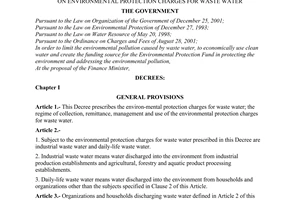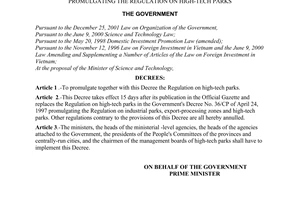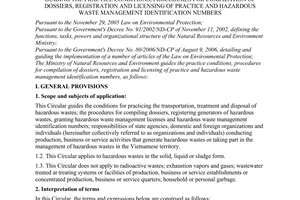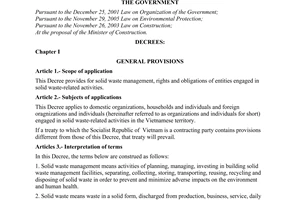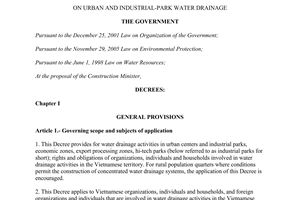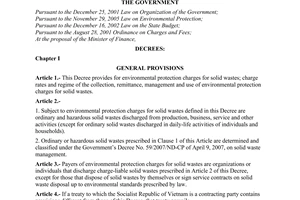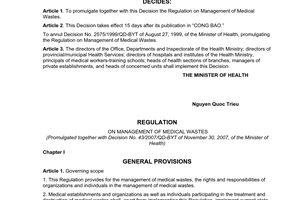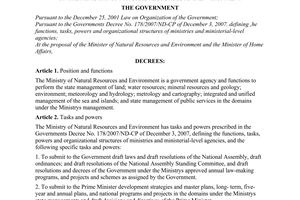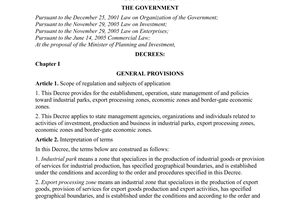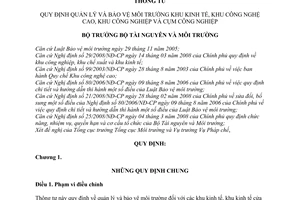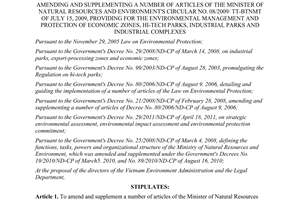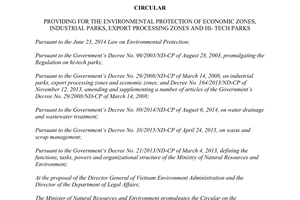Circular No. 08/2009/TT-BTNMT of Junly 15, 2009, providing for the environmental management and protection of economic zones, hi-tech parks, industrial parks and industrial complexes đã được thay thế bởi Circular No. 35/2015/TT-BTNMT providing for the environmental protection of economic zones industrial parks và được áp dụng kể từ ngày 17/08/2015.
Nội dung toàn văn Circular No. 08/2009/TT-BTNMT of Junly 15, 2009, providing for the environmental management and protection of economic zones, hi-tech parks, industrial parks and industrial complexes
|
THE
MINISTRY OF NATURAL RESOURCES AND ENVIRONMENT |
SOCIALIST
REPUBLIC OF VIETNAM |
|
No. 08/2009/TT-BTNMT |
Hanoi, July 15, 2009 |
CIRCULAR
PROVIDING FOR THE ENVIRONMENTAL MANAGEMENT AND PROTECTION OF ECONOMIC ZONES, HI-TECH PARKS, INDUSTRIAL PARKS AND INDUSTRIAL COMPLEXES
THE MINISTER OF NATURAL RESOURCES AND ENVIRONMENT
Pursuant to the November 29,
2005 Law on Environmental Protection;
Pursuant to the Government’s Decree No. 29/2008/ND-CP dated March 14, 2008, on
industrial parks, export processing zones and economic zones;
Pursuant to the Government’s Decree No. 99/2003/ND-CP dated August 28, 2003,
promulgating the Regulation on Hi-Tech Parks;
Pursuant to the Government’s Decree No. 80/2006/ND-CP dated August 9, 2006,
detailing and guiding a number of articles of the Law on Environmental
Protection;
Pursuant to the Government’s Decree No. 21/2008/ND-CP dated February 28, 2008,
amending and supplementing a number of articles of the Government’s Decree No.
80/2006/ND-CP dated August 9, 2006, detailing and guiding a number of article
of the Law on Environmental Protection;
Pursuant to the Government’s Decree No. 25/2008/ND-CP dated March 4, 2008,
defining the functions, tasks, powers and organizational structure of the
Ministry of Natural Resources and Environment;
At the proposal of the Director General of the General Department of
Environment and the Director of the Department of Legal Affairs,
STIPULATES:
Chapter I
GENERAL PROVISIONS
Article 1. Governing scope
This Circular provides for the environmental management and protection of economic zones and border-gate economic zones (below collectively referred to as economic zones and abbreviated to EZs), hi-tech parks (abbreviated to HTPs), industrial parks and export-processing zones (below collectively referred to as industrial parks and abbreviated to IPS) and industrial complexes (abbreviated to ICS).
Article 2. Subjects of application
This Circular applies to state management agencies for environmental protection at all levels, Economic Zone Management Boards, Hi-Tech Park Management Boards, Industrial Park Management Boards and Industrial Complex-Managing Agencies, investors building and operating technical infrastructure of economic zones, hi-tech parks, industrial parks and industrial complexes, as well as domestic organizations and individuals involved in investment, production, business or service activities in economic zones, hi-tech parks, industrial parks and industrial complexes.
Article 3. Principles for environmental protection of economic zones, hi-tech parks, industrial parks and industrial complexes
1. To realize the contents of environmental protection of EZs, HTPs, IPs and ICs prescribed in legal documents on environmental protection.
2. The environmental protection of EZs, HTPs, IPs and ICs shall be carried out regularly with prevention as a major step at all stages: formulation of construction plans; investment preparation; approval of investment projects; construction of technical infrastructure; construction of investment projects; and throughout their operation.
Article 4. Organizations taking direct responsibility for environmental protection of economic zones, hi-tech parks, industrial parks and industrial complexes
1. The Economic Zone Management Boards, the Hi-Tech Park Management Boards, Industrial Park Management Boards and Industrial Complex-managing Agencies shall take direct responsibility for the management of environmental protection under the authorization of competent state agencies.
2. Economic Zone Management Boards, Hi-Tech Park Management Boards, Industrial Park Management Boards and Industrial Complex-Managing agencies must have professional units and officers for environmental protection as provided for in the Government's Decree No. 81/2007/ND-CP dated May 23, 2007, providing for organizations and professional sections for environmental protection at state agencies and state enterprises.
3. Investors building and operating technical infrastructure of EZs, HTPs, IPs and ICs must have professional sections or officers for environment protection as provided for by law.
4. Production, business or service establishments in EZs, HTPs, IPs and ICs shall arrange part-time officers to monitor environmental protection work.
Chapter II
ENVIRONMENTAL MANAGEMENT AND PROTECTION AT THE STAGE OF INVESTMENT PREPARATION FOR CONSTRUCTION OF ECONOMIC ZONES, HI-TECH PARKS, INDUSTRIAL PARKS AND LNDUSTRIAL COMPLEXES
Article 5. Environmental protection in the formulation of planning on construction of economic zones, hi-tech parks, industrial parks and industrial complexes
1. The planning on construction of Ezs, HTPs, IPs or ICs must conform to the socio-economic development plannings of regions, land use plannings of provinces and run cities, restricting the use of agricultural cultivation land, not infringing upon nature reserves and national parks, and ensuring sustainable development as well as security and defense.
Master plans on development of Ezs must be accompanied with reports on strategic environmental assessment as provided for by law.
2. The minimum proportion of land covered with trees must reach 15% of the total land area of an EZ, HTP, IP or IC.
3. The planning on construction of economic zones must rationally and clearly arrange space for functional quarters, suitable to the operating nature of economic zones, minimizing adverse impacts on the surrounding environment and among functional quarters. Industrial parks and projects in economic zones, which generate various sources of emission and noise must be arranged at the end of the prevailing wind direction for economic zones and isolated from urban centers and other quiet functional quarters by tree strips of prescribed width; projects generating large volumes of wastewater must located close to one another and at the en of the water sources of the economic zones.
4. The land use planning for functional quarters of economic zones must conform to the natural conditions and current environment of the region and to the plans on prevention and combat of earthquakes, storms, floods, flash floods, landslides and sea level rise.
5. Eco-tourism activities and facilities as well as infrastructure in service of eco-tourism in nature conservation zones or national gardens in economic zones (if any) must be permitted by state management agencies in charge of nature conservation and national parks.
Article 6. Environmental protection in the designing of systems of technical infrastructure of economic zones, hi-tech parks, industrial park and industrial complexes.
1. EZ, HTP, IP and IC technical infrastructure systems comprising road system, water supply system, water drainage and wastewater treatment systems, electricity supply and lighting system and communications system must be simultaneously and synchronously designed to facilitate construction, repair and operation, ensure thrifty use of land, observe Vietnam construction standards, and meet environmental protection requirements.
2. Locations must be arranged for temporary keeping and transit of solid wastes in EZs, HTPs, IPs and ICs; establishments receiving and treating ordinary solid wastes and hazardous wastes of EZs, HTPs IPs and ICs must be clearly identified.
3. Wastewater drainage systems must be totally separated from rainwater drainage systems. Industrial wastewater-collecting networks must be built with underground wastewater-collecting tanks at proper positions for connection with wastewater discharge points of enterprises in HTPs, IPs and ICs.
4. HTPs, IPs and ICs must have concentrated wastewater treatment plants, which can be divided into various modules but must ensure their total capacity of treating the whole volume of wastewater up to national environmental standards when these zones are filled up. Concentrated wastewater treatment plants must be designed for installation of systems for automatic and constant observation of pH, DO, COD, TSS and some other typical parameters in wastewater of HTPs, IPs and ICs as required in the decisions approving reports on assessment of environmental impacts.
5. The schemes for treatment of daily-life wastewater from functional quarters in EZs: urban centers, population quarters, non-tariff zones, entertainment areas, tourist resorts, administrative quarters and other functional quarters depend on the practical situation, which can be treated on spot, treated according to construction clusters or treated at daily-life wastewater treatment plants of EZs. All these modes of daily-life wastewater treatment must be designed to treat wastewater up to national technical standards on environment before being discharged into receiving sources.
Article 7. Responsibilities of investors building and operating infrastructure of economic zones, hi-tech parks, industrial parks, industrial complexes
To formulate reports on assessment of environmental impacts or to commit to protect the environment under the Government's Decree No.80/2006/ND-CP dated August 9, 2006, detailing and guiding a number of articles of the Law on Environmental Protection, and Decree No. 21/2008/ND-CP dated February 28, 2008, amending and supplementing a number of articles of Decree No. 80/2006/ND-CP dated August 9, 2006.
Chapter III
ENVIRONMENTAL MANAGEMENT AND PROTECTION IN THE PERIOD OF CONSTRUCTING ECONOMIC ZONES, HI-TECH PARKS, INDUSTRIAL PARKS AND INDUSTRIAL COMPLEXES
Article 8. Management of solid wastes in the period of ground clearance
Organizations and individuals conducting ground clearance and preparing land for construction shall collect and treat all arising solid wastes in accordance with the law on solid waste management.
Article 9. Responsibilities of investors constructing and operating technical infrastructure of economic zones, hi-tech parks, industrial parks and industrial complexes.
1. To strictly realize the contents of decisions approving reports on assessment of environmental impacts of investment projects for construction and commercial operation of technical infrastructure of EZs, HTPs, IPs and ICs.
2. To send to agencies approving environmental impact assessment and the EZ, HTP or IP Management Boards or IC-Managing Agencies for monitoring, inspection and supervision reports on the construction and installation plans enclosed with detail designing dossiers of environmental solution facilities as well as plans on environment oversight during construction.
3. Regarding solid waste management: To strictly implement the contents prescribed in Clause 2, Article 6 of this Circular and legal provisions on solid waste management.
4. Regarding wastewater treatment:
a/ Concentrated wastewater treatment plants must be constructed according to set schedules and designs in the approved investment projects and be commissioned before production, business and service investment projects in EZs, HTPs, IPs and ICs commence operation;
b/ The schedules for construction of concentrated wastewater treatment plants or their modules must conform to the schedules of filling up HTPs, IPs and ICs with investment projects;
c/ To synchronously install water meters at the outlets of concentrated wastewater treatment plants;
d/ To formulate plans for trial operation of wastewater treatment plants of IPs or ICs and wastewater treatment facilities of other functional quarters in EZs or HTPs, which will be sent to agencies approving environmental impact assessment reports and the EZ, HTP or IP Management Boards or IC-Managing Agencies before their official operation; to sent written reports on rea/1zation of the contents of environmental impact assessment reports to the report-approving agencies and to be permitted to officially operate such works only when these agencies issue written approval.
5. To plant, tend and protect trees in public places in EZs, HTPs, IPs and ICs.
Article 10. Responsibilities of EZ, HTP, IP Management Boards and IC-Managing Agencies
1. To assume the prime responsibility for, and coordinate with state management agencies for environmental protection in, inspecting and supervising the realization of contents in environmental impact assessment reports or written environmental protection commitments which have already been approved or certified in the period of project construction.
2. To detect and promptly report on violations of the law on environmental protection to competent environmental protection state management agencies for solution and handling.
Article 11. Responsibilities of state management agencies for environmental protection
To assume the prime responsibility for, and coordinate with the EZ, HTP or IP Management Boards and IC-Managing Agencies in, inspecting the realization of contents in decisions approving environmental impact assessment reports or certifying environmental protection commitments of investors developing technical infrastructure of economic zones, hi-tech parks, industrial parks and industrial complexes.
Chapter IV
ENVIRONTAL MANAGEMENT AND PROTECTION DURING THE OPERATION OF ECONOMIC ZONES, HI-TECH PARKS, INDUSTRIAL PARKS AND INDUSTRIAL COMPLEXES
Article 12. Responsibilities of EZ, HTP or IP Management Boards and IC-Managing Agencies
1. To consider and admit only investment projects belonging to production and business lines defined in the reports on assessment of environmental impacts of investment projects for development of EZ, HTP, IP and IC technical infrastructure, which have been approved by competent state management agencies.
2. To prioritize projects with modern production technologies, high technologies, without or less polluting the environment, and projects applying cleaner, and more environmentally friendly and energy-saving production technologies.
3. Not to admit projects with backward technologies and equipment and low raw-material and fuel-using efficiency, which generate voluminous wastes threatening to cause serious environmental pollution.
Article 13. Conditions for production, business or service investment projects in economic zones, hi-tech parks, industrial parks or industrial complexes to be put into operation
1. Locations for keeping and transit of solid wastes in EZs, HTPs, IPs or ICS have been completely arranged and the establishments receiving and treating ordinary solid wastes and hazardous wastes of EZs, HTPs, IPs or ICs have been identified, as mentioned in Clause 2 of Article 6 and Clause 3 of Article 9 of this Circular.
2. Wastewater outlets of production, business or service projects have been directly connected to concentrated wastewater treatment plants of EZs, HTPs, IPs or ICs.
3. Wastewater, discharged gas and noise treatment equipment in production projects have been fully installed and put into trial operation and other environmental protection measures stated in environmental impact assessment reports or environmental protection commitments have been applied.
Article 14. Responsibilities of investors in production, business or service projects in economic zones, hi-tech parks, industrial parks or industrial complexes
1. To make and submit to competent agencies environmental impact assessment reports for approval or written environmental protection commitments for certification as provided for in the Government's Decree No. 80/2006/ND-CP dated August 9, 2006, detailing and guiding a number of articles of the Law on Environmental Protection, and Decree No. 21/2008/ND-CP dated February 28, 2008, amending and supplementing a number of articles of Decree No. 80/2006/ND-CP dated August 9, 2006.
2. To strictly and fully implement the decisions approving the environmental impact assessment reports or environmental protection commitment, already approved or certified by competent state management agencies.
3. To send to the agencies approving environmental impact assessment reports or certifying environmental protection commitments, the EZ, HTP or IP Management Boards or the IC-Managing Agencies for monitoring, inspection and supervision plans on construction and installation of environmental treatment facilities and plans on environment self-oversight in the construction period.
4. To sign agreements or economic contracts with EZ, HTP, IP or IC technical infrastructure developers on conditions for discharge of wastewater of enterprises into concentrated wastewater treatment plants.
5. To connect the outlets of wastewater drainage systems to concentrated wastewater treatment plants under the supervision of EZ, HTP, IP, or IC technical infrastructure developers.
6. To facilitate wastewater observation, sampling and measurement at the outlets of wastewater preliminary treatment facilities of enterprises.
Article 15. Responsibilities of EZ, HTP, IP and IC technical infrastructure developers
1. To monitor and supervise the waste discharge by production, business and service establishments into concentrated wastewater treatment plants strictly under the concluded contracts.
2. To install meters for measurement of production, business and service establishments' wastewater volumes discharged into concentrated wastewater treatment plants and to ensure proper technical operations of wastewater treatment works and facilities for collecting, sorting, temporary keeping and treatment of solid wastes of EZs, HTPs, IPs and ICs.
Article 16. Air environment protection and noise reduction in economic zones, hi-tech parks, industrial parks and industrial complexes
1. All production, business and service establishments shall abide by national technical standards on environment with regard to emission and noise; apply technological solutions, and install and operate discharged gas treatment equipment as stated in the environmental impact assessment reports or environment protection commitments.
2. To encourage the application of production technologies friendly to the environment, cleaner and energy-saving production solutions, especially for industries with the potential of discharging wastes which cause serious air pollution, such as petro-chemical, metallurgical, thermo-electric, chemical, cement and paper manufacturing industries.
3. Production, business and service establishments in EZs, HTPs, IPs or ICs shall pay environmental protection charges for discharged gases as provided for by law.
Article 17. Water environment protection in economic zones, hi-tech parks, industrial parks and industrial complexes
1. All water drainage activities of EZs, IPs and ICs must comply with the Government’s Decree No. 88/2007/ND-CP dated May, 28, 2007, on urban and industrial park water drainage.
2. The discharge of wastewater into receiving sources must comply with legal provisions on protection of water environment, resources, exploitation of water resources and protection of irrigation works. It is strictly forbidden to directly discharge (untreated or sub-standard treated) wastewater into receiving sources.
3. Wastewater of production, business and service establishments must all be preliminarily treated up to set requirements before being discharged into concentrated wastewater treatment plants. EZ, HTP, IP or IC technical infrastructure developers shall set conditions for the discharge of wastewater of production, business and service establishments into concentrated wastewater treatment plants. Daily-life wastewater of production, business, service establishments as well as organizations and individuals in HTPs, IPs and ICs, after being preliminarily treated (by underground toilet tanks…) must be further treated at concentrated wastewater treatment plants. Wastewater must be treated up to national technical standards on environment before being discharged into receiving sources.
4. All vessels are forbidden to discharge wastewater and ballast water not yet treated up to national technical standards on environment and solid wastes into river, stream and coastal areas of EZs, HTPs, IPs and ICs.
5. Production, business and service establishments in EZs, HTPs, IPs and ICs shall pay wastewater charges as provided for in the Government’s Decree No. 67/2003/ND-CP dated June 13, 2003, on environment protection charges
with regard to wastewater, and Decree No.04/2007/ND-CP dated January 8, 2007, amending and supplementing a number of articles of Decree No. 67/ND-CP dated June 13, 2003.
Article 18. Management of solid wastes and hazardous wastes generated in economic zones, hi-tech parks, industrial parks and industrial complexes
1. All production, business and service establishments in EZs, HTPs, IPs and ICs as well as households in EZs shall sort solid wastes at source as provided for by law.
2. Solid wastes of EZs, HTPs, IPs and ICs must be 100% collected and classified into non-hazardous wastes (ordinary solid wastes), medical wastes and hazardous wastes.
3. The collection, sorting, transportation and treatment of hazardous solid wastes generated from medical activities comply with the Minister of Health's Decision No. 43/2007/QD-BYT dated November 30, 2007, promulgating the Regulation on Management of Medical Wastes.
4. The collection, sorting, transportation and treatment of hazardous solid wastes generated from production and business activities comply with the Government’s Decree No. 59/2007/ND-CP dated April 9, 2007, on management of solid wastes, and the Ministry of Natural Resources and Environment's Circular No. 12/2006/TT-BTNMT dated December 26, 2006, guiding the practice of hazardous waste management and the compilation of registration dossiers of application for hazardous waste management practicing licenses and codes.
5. Sediment mud of wastewater treatment stations and water drainage networks of EZs, HTPs, IPs and ICs must be collected, preliminarily treated and separately transported by special-use vehicles to concentrated solid waste treatment establishments for hygienic treatment up to the national technical standards on environment.
6. All production, business and service establishments generating hazardous wastes shall compile dossiers for waste source owners registration with provincial-level Departments of Natural Resources and environment or EZ, HTP, IP and IC Management Boards (if so authorized) as guided in the Ministry of Natural Resources and Environment's Circular No. 12/2006/TT-BTNMT dated December 26, 2006, guiding the practice of hazardous waste management and the compilation of registration dossiers of application for hazardous waste management practicing licenses and codes, and at the same time sign contracts with units licensed to collect, transport, treat and destroy hazardous wastes for treatment according to law.
7. Production, business and service establishments in EZs, HTPs, IPs and ICs shall pay solid waste charges as provided for in the Government's Decree No. 174/2007/ND-CP dated November 29, 2007, on environmental protection charges with regard to solid wastes.
Article 19. Response to environmental incidents
Upon the occurrence of environmental incidents, the Management Boards and production, business as well as service establishments in EZs, HTPs, IPs and ICs shall urgently mobilize personnel, materials and means for timely response, and at the same time immediately notify concerned agencies thereof, if the incidents are beyond their responding capabilities, they shall urgently report thereon to competent superior agencies for handling.
Chapter V
OBSERVATION, INFORMATION AND REPORT ON THE ENVIRONMENT OF ECONOMIC ZONES, HI-TECH PARKS, INDUSTRIAL PARKS AND INDUSTRIAL COMPLEXES
Article 20.Observation of, and reporting on, the environment of economic zones, hi-tech parks, industrial parks and industrial complexes in the period of construction
1. EZ, HTP, IP or IC technical infrastructure developers and production, business or service investment project owners shall themselves organize the observation of investment projects' environment.
2. Environment observation must comply with the contents of environment management and observation programs stated in approved environmental impact assessment reports or certified written environment protection commitments.
3. After each drive of environment observation, technical infrastructure developers and production; business and service investment project owners in EZs, HTPs, IPs and ICs (for ICs set up by provincial-level People’s Committees) shall report on environment observation results to EZ, HTP, IP Management Boards or IC-Managing Agencies and provincial-level Departments of Natural Resources and Environment. Technical infrastructure developers and production, business or service investment project owners in ICs (for ICs set up by district-level People's Committees) shall report on environment observation results to the IC-Managing Agencies and district-level People’s Committees and take responsibility for their reported data.
Article 21. Observation of, and reporting on, the environment of economic zones, hi-tech parks, industrial parks and industrial complexes in the period of operation
1. EZ, HTP or IP Management Boards and IC-Managing Agencies shall periodically organize the observation of the common environment of their respective areas at least twice a year; send reports on environment observation results to the General Department of Environment and provincial-level Departments of Natural Resource and Environment and take responsibility before law for their reported data.
2. Technical infrastructure developers shall periodically organize observation at least twice a year and report to the EZ, HTP, IP or IC Management Boards on the pollution degree of wastewater from concentrated wastewater treatment stations, water quality of the receiving sources, operation of concentrated wastewater treatment facilities, collection, transportation and treatment of solid wastes of EZs, HTPs, IPs and ICs (special features, nature and volume of assorted wastes, waste treatment options and treatment results) and relevant environmental matters.
3. Production, business and service establishments in EZs, HTPs, IPs or ICs (for ICs set up by provincial-level People's Committees) shall carry out their self- observation programs and report on the results to EZ, HTP or IP Management Boards, or IC-Managing Agencies, provincial-level Departments of Natural Resources and Environment; production, business and service establishments in ICs (for ICs set up by district-level people's Committees) shall carry out their self-observation programs and report on the results to the IC- Managing Agencies and district-level people's Committees.
4. The funds for observation of the common environment of EZs or HTPs will be provided by the state budget; the funds for observation of the environment of IPs or ICs will be provided by technical infrastructure developers; the funds for the observation of the environment of production, business and service establishments will be provided by these establishments.
Article 22. Publicity of information on the environment of economic zones, hi-tech parks, industrial parks, industrial complexes and production, business as well as service establishments
1. Information on the environment of EZs, IPs and ICs must be publicized under publicized under Article 104 of the Law on Environmental Protection.
2. Contents and forms of publicizing information on the environment of EZs, HTPs, IPs and ICs:
a/ Publicized information must be truthful, objective, easy to understand, brief and suitable to relevant subjects receiving the information;
b/ Information can be publicized in such forms as publication on newspapers, websites of enterprises, report at meetings of People's Councils at different levels, announcement at meetings of population quarters, posting at the headquarters of EZ, HTP or IP Management Boards or IC-Managing Agencies and the offices of commune-level People's Committees of localities where the EZs, HTPs, IPs or ICs are operating.
3. EZ, HTP or IP Management Boards and IC-Managing Agencies shall publicize information on the environment in their respective EZs, HTPs, IPs or ICs; production, business or service establishments in EZs. HTPs, IPs and ICs shall publicize information on the environment within their establishments and take responsibility before law for the accuracy, truthfulness and objectivism of their publicized information. Provincial-level Departments of Natural Resources and Environment of the localities where the EZs, HTPs, IPs and ICs are located shall inspect and supervise the publicity of information on the environment by the Management Boards and production, business as well as service establishments.
Article 23. Practice of grassroots democracy on matters related to the environment of economic zones, hi-tech parks, industrial parks and industrial complexes
1. EZ, HTP, IP and IC technical infrastructure developers; EZ, HTP or IP Management Boards; IC Managing Agencies; professional
5. Dialogue results must be recorded in writing, acknowledging the reached agreements to be used as bases for implementation by concerned responsible parties or for handling of violations of the law on environmental damage.
Chapter VI
STATE MANAGEMENT AGENCIES’ RESPONSIBILITIES FOR ENVIRONMENTAL PROTECTION OF ECONOMIC ZONES, HI-TECH PARKS, INDUSTRIAL PARKS AND INDUSTRIAL COMPLEXES
Article 24. Responsibilities of concerned ministries and branches
Concerned ministries and branches shall perform the tasks specified in Article 121 of the Law on Environmental Protection, ordinate with the Ministry of Natural Resources and Environment in directing, guiding and inspecting the implementation of the law on environmental protection with regard to EZs, HTPs, or ICs under their management.
Article 25. Responsibilities of the General Department of Environment
The General Department of Environment shall assist the Ministry of Natural Resources and Environment in performing tasks and management responsibilities for environmental protection of EZs, HTPs, IPs and ICs, guiding, inspecting and urging the implementation of this Circular.
Article 26. Responsibilities of provincial-level People's Committees
1. To promulgate Regulations on coordination between Management Boards and professional organizations of provincial-level People’s Committees in the environmental management and protection of EZs, HTPs, Ips and ICs in their localities.
2. To direct the examinations and inspections; to settle disputes, complaints, denunciations and petitions and handle violations of the law on environment, which fall under their jurisdiction.
3. To direct their Departments, Boards and sectors to support production, business or service establishments in EZs, HTPs, IPs or ICs in responding to and addressing environmental incidents.
Article 27. Responsibilities of provincial-level Departments of Natural Resources and Environment
1. To coordinate with EZ, HTP or IP Management Boards and IC-Managing Agencies in inspecting and overseeing the implementation of this Circular and the of law on environmental protection in EZs, HTPs, IPs and ICs.
2. To assume the prime responsibility for, or coordinate with EZ, HTP, IP Management Boards and IC-Managing Agencies (if these agencies are authorized to appraise reports on assessment of environmental impacts) in, checking and certifying the results of trial operation of waste treatment facilities of investment projects on construction and commercial operation of technical infrastructure of EZs, HTPs, IPs of ICs as well as waste treatment facilities of construction investment projects in EZs, HTPs, IPs and ICs before they are officially commissioned.
3. To assume the prime responsibility for, and coordinate with EZ, HTP or IP Management Boards and IC-Managing Agencies in, examining and inspecting the environmental protection and the implementation of contents of the decisions approving the environmental impact assessment reports of EZ, HTP, IC technical infrastructure developers as well as production, business or service establishments in EZs, HTPs, IPs and ICs according to their competence.
4. To coordinate with EZ, HTP, IP Management Boards and IC-Managing Agencies in settling disputes, complaints, denunciations related to the environmental protection of EZs, HTPs, IPs and ICs within the ambit of their delegated powers.
5. To coordinate with EZ, HTP or IP Management Boards and IC-Managing Agencies in disseminating legal documents on environmental protection, raising the environmental protection awareness of EZ, HTP, IP or IC technical infrastructure developers as well as production, business or service establishments in EZs, HTPs, IPs or ICs.
6. To supervise the publicity of information and data on the environment of EZs, HTPs, IPs and ICs.
7. To appraise declarations, notify on and organize the collection of environment protection charges from enterprises in EZs, HTPs, IPs and ICs (except for IPs and ICs authorized by competent authorities to appraise and collect the charges).
Article 28. Responsibilities of EZ, HTP or IP Management Boards
1. To direct, guide and urge production, business or service establishments and functional quarters in EZs, production, business or service establishments in HTPs or IPs under their management to implement this Circular.
2. To formulate a mechanism for coordination with provincial-level Departments of Natural Resources and Environment and district-level People's Committees in performing the assigned tasks and delegated powers in the environmental protection of IZs, HTPs or IPs.
3. To appraise and approve reports on assessment of environmental impacts and certify environmental protection commitments of projects for investment in EZs, HTPs or IPs under authorization of competent state agencies. The authorized EZ, HTP or IP Management Boards shall send reports on results of appraising and approving the reports on assessment of environmental impacts to provincial-level Departments of Natural Resources and Environment and results of certifying the environmental protection commitments to Natural Resources and Environment Sections of districts where the EZs, HTPs or IPs are located.
4. To assume the prime responsibility for, or coordinate with provincial-level departments of Natural Resources and Environment and relevant functional bodies in, examining and certifying the outcomes of trial operation of waste treatment facilities of investment projects for construction and commercial operation of EZ, HTP or IP technical infrastructure as well as waste treatment facilities of construction investment projects in EZs, HTPs or IPs before they are officially commissioned, according to their competence.
5. To coordinate with functional bodies in supervising, examining, inspecting and handling environmental protection-related violations by EZ, HTP or IP technical infrastructure developers as well as production, business or service establishments in EZs, HTPs or IPs.
6. To assume the prime responsibility for disseminating legal documents on environmental protection and raising the environmental protection awareness of EZ, HTP or IP technical infrastructure developers and production, business or service establishments in EZs, HTPs or IPs.
7. To receive and handle environment-related disputes or petitions between production, business or service establishments in EZs, HTPs or IPs; to assume the prime responsibility for, and coordinate with functional bodies in, settling environment-related disputes and petitions between production, business or service establishments in EZs, HTPs or IPs and outsiders; to receive and settle according to their competence complaints and denunciations about the environment in EZs, HTPs or IPs.
8. To perform other tasks according to their competence or under authorization as provided for by law.
Article 29. Responsibilities of district-level People's Committees
1. To certify written environment protection commitments of investment projects in EZs, HTPs, IPs or ICs according to their competence.
2. To direct according to their competence the inspection and supervision of plans on trial operation of waste treatment facilities of investment projects in ICs before they are officially commissioned.
3. To direct according to their competence the examination, inspection and handling of violations of the law on environmental protection; to settle disputes, complaints, denunciations and petitions on environmental protection of ICs in the districts.
4. To support production, business or service establishments in ICs in responding addressing environmental incidents.
5. To perform other tasks according to their competence or under authorization as provided for by law.
Article 30. Responsibilities of IC-Managing Agencies
1. To direct, guide and urge IC technical infrastructure developers as well as production, business or service establishments in ICs under their management in implementing this Circular and the law on environmental protection.
2. To direct IC technical infrastructure developers in making plans for environmental incident prevention and combat and in responding to and addressing environmental incidents in ICs under their management.
3. To coordinate with functional bodies in supervising, examining and inspecting the environmental protection of ICs in the course of project appraisal, construction and operation of ICs, according to their competence.
4. To receive and settle environmental protection related disputes, petitions between production, business or service establishments in ICs; to coordinate with functional bodies in settling environmental protection-related disputes and petitions between production, business or service establishment in ICs and the outsiders; to receive and settle according to their competence complaints and denunciations about the environment in ICs.
5. To petition, propose competent state management agencies to handle violations of this Circular and other regulations on environmental protection.
Article 31. Responsibilities of environmental impact assessment report-approving agencies
1. To send the originals of decisions approving the reports on assessment of environmental impacts of investment projects for construction and commercial operation of EZ, HTP, IP or IC technical infrastructures and decisions approving the reports on assessment of environmental impacts of production, business or service investment projects in EZs, HTPs, IPs or ICs to projects investors, EZ, HTP, IP or IC Management Boards, provincial-level People’s Committee and provincial-level Department of Natural Resources and Environment of localities where the projects exist.
2. To check and compare dossiers on designing and construction of environmental treatment facilities with reports on assessment of environmental impacts of the approved projects. Upon detection of disparities, within 7 working days after the receipt of dossiers, to notify the project investors thereof in writing for adjustment or supplementation.
3. To receive and handle proposals or petitions of organizations and individuals involved in the implementation of environmental protection contents and measures in the course of construction of environmental treatment facilities of the projects.
4. To inspect and supervise the trial operation of waste treatment facilities of projects after receiving trial operation plans of project investors and certify the results of trial operation of waste treatment facilities of the projects.
5. To keep and manage all dossiers and documents on appraisal of reports on assessment of environmental impacts as well as dossiers and documents on post-appraisal operation, forwarded by project investors, concerned agencies and individuals.
Chapter VII
EXAMINATION, INSPECTION, AND SETTLEMENT OF COMPLAINTS AND DENUNCIATIONS
Article 32. Examination and inspection
1. Environmental protection state management agencies at all levels shall, within the ambit of their respective powers and responsibilities, environmentally examine and inspect periodically or extraordinarily organizations and individuals carrying out activities related to the environment in EZs, HTPs, IPs or ICs as provided for by law.
2. EZ, HTP or IP Management Boards or IC-Managing Agencies shall coordinate with environmental protection state management agencies at different levels in conducting examination and inspection at EZs, HTPs, IPs or ICs under their management according to current law.
3. The Environment Police shall participate and coordinate in examining and inspecting the environmental protection of EZs, HTPs, IPs or ICs under Joint Circular No. 02/2009/TTLT-BCA-BTNMT dated February 6, 2009 of the Ministry of Public Security and the Ministry of Natural Resources and Environment, guiding coordination in prevention and combat of crimes and violations of the law on environmental protection.
4. Environmental examination and inspection results will be addressed to examined or inspected subjects, serving as bases for redress of violations; and concurrently to environmental protection state management agencies at different levels and local administrations for use as bases for monitoring and settlement direction.
Article 33. Settlement of environment-related complaints and denunciations
Organizations and individuals are entitled to complain about or denounce to environmental protection state management agencies and concerned agencies violations of the law on environment protection and this Circular. Complaint- or denunciation-receiving agencies shall consider and settle them according to law.
Chapter VIII
IMPLEMENTATION PROVISIONS
Article 34. Handling of existing problems
1. EZs, HTPs, IPs and ICs which have operated without concentrated wastewater treatment plants shall build and commission such plants before December 31, 2010.
2. Production, business or service establishments operating in EZs, HTPs, IPs or ICs defined in Clause 1 of this Article shall:
a/ Treat their wastewater up to national technical standards before discharging it into the environment;
b/ Connect their wastewater treatment systems to industrial wastewater colleting networks when the concentrated wastewater treatment plants of EZs, HTPs, IPs or ICs are put into operation, if they fail to fully meet the conditions on connection exemption as provided for in Article 45 of the Government’s Decree No. 88/2007/ND-CP dated 28, 2007, on urban and industrial park water drainage.
Article 35. Effect
1. This Circular takes effect on September 1, 2009.
2. The Minister of Science, Technology and Environment's Decision No. 62/2007/QD-BKHCNMT dated August 9, 2002, promulgating the Regulation on environmental protection of industrial parks, ceases to be effective on the date this Circular takes effect.
Article 36. Implementation responsibilities
1. Ministries, concerned branches, People's Committees at all levels, the General Department of Environment, provincial-level Departments of Natural Resources and Environment, EZ, HTP or IP Management Boards, IC-Managing Agencies, EZ, HTP, IP or IC technical infrastructure developers and owners of production, business or service establishments operating in EZs, HTPs, IPs or ICs shall implement this Circular.
2. The General Department of Environment shall inspect and urge the implementation of this Circular.
3. If meeting with difficulties or problems in the course of implementation, agencies, organizations and individuals should promptly report them to the Ministry of Natural Resources and Environment for proper amendment or supplementation.
|
|
FOR
THE MINISTER OF NATURAL RESOURCES AND ENVIRONMENT |

